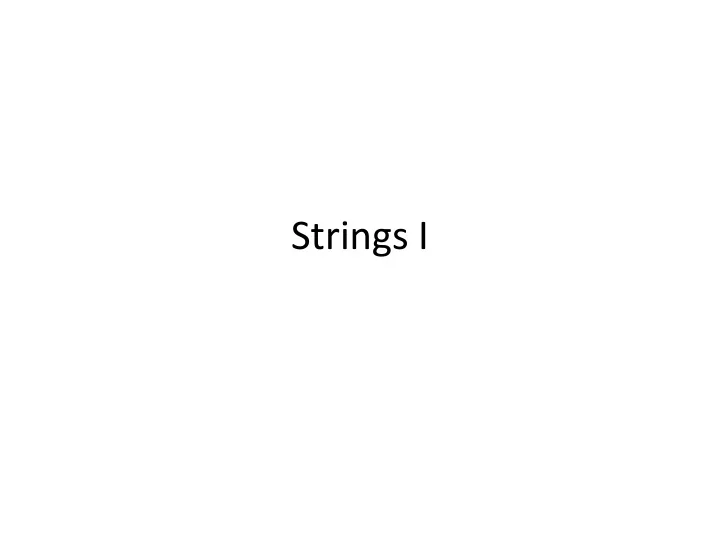

Strings I
Strings are built from characters The string "Computer" is represented internally like this: "C" "o" "m" "p" "u" "t" "e" "r" • Each piece of a string is called a character . • A character is a special kind of string that is made up of exactly one letter, number, or symbol.
Accessing characters Each character in a string is numbered by its position: 0 1 2 3 4 5 6 7 "C" "o" "m" "p" "u" "t" "e" "r" The numbers above the characters are called indices (singular: index ) or positions .
Accessing characters 0 1 2 3 4 5 6 7 "C" "o" "m" "p" "u" "t" "e" "r" • There is a separate variable for each character in the string, which is the string variable followed by [ ] with an integer in the middle. my_string = "Computer" my_string[0] # prints C my_string[7] # prints r
Accessing characters 0 1 2 3 4 5 6 7 "C" "o" "m" "p" "u" "t" "e" "r" • These individual variables can be used just like regular variables, except you cannot assign to them . my_string = "Computer" my_string[0] = "B" # illegal! • Think of the notation variable [ i ] as meaning "Give me the i 'th letter of variable ."
0 1 2 3 4 5 6 7 "C" "o" "m" "p" "u" "t" "e" "r" • You can print them, assign them to variables, pass them to functions, etc. my_string = "Computer" first = my_string[0] third = my_string[2] print(first, third, my_string[4])
Another Example name = input("What is your name? ") initial = name[0] print("The first initial of your name is", initial) Sample output What is your name? Phil The first initial of your name is P
witch = "McGonagall" wizard = "Dumbledore" x = 1 y = 2 print(witch[x], wizard[y]) print(witch[x+y]) if wizard[y] > wizard[y+1]: print("Yes") else: print("No")
Getting the length of a string • Assume string is a string variable • len(string) returns the length of string • len("Computer") returns 8 5 • len("A B C") return ??? 0 • len("") returns ??? • len uses return , meaning if you want to capture the length, you should save the return value in a variable. length_of_string = len(string_variable)
What if we wanted to print all the characters in a string separately? greeting = "hello" print(greeting[0]) print(greeting[1]) print(greeting[2]) print(greeting[3]) print(greeting[4])
What if we wanted to print all the characters in a string separately? city = "Memphis" print(city[0]) print(city[1]) print(city[2]) print(city[3]) print(city[4]) print(city[5]) print(city[6])
Loops over strings • Accessing characters via numbers naturally leads to using a for loop to process strings. • What is the first numerical position in string ? 0 • What is the last numerical position in string ? len(s)-1 # assume string is a string variable for pos in range(0, len(string)): # do something with string[pos]
Loops over strings • Accessing characters via numbers naturally leads to using a for loop to process strings. # assume string is a string variable for pos in range(0, len(string)): print(string[pos])
s = "banana" for pos in range(0, len(s)): print(s[pos]) 0 1 2 3 4 5 "b" "a" "n" "a" "n" "a"
s = "banana" for pos in range(0, len(s)): print(s[pos]) 1st iteration pos: 0 pos s[pos]: "b" 0 1 2 3 4 5 OUTPUT "b" "a" "n" "a" "n" "a" b s[pos]
s = "banana" for pos in range(0, len(s)): print(s[pos]) 2 nd iteration pos: 1 pos s[pos]: "a" 0 1 2 3 4 5 OUTPUT "b" "a" "n" "a" "n" "a" b a s[pos]
s = "banana" for pos in range(0, len(s)): print(s[pos]) 3 rd iteration pos: 2 pos s[pos]: "n" 0 1 2 3 4 5 OUTPUT "b" "a" "n" "a" "n" "a" b a s[pos] n
s = "banana" for pos in range(0, len(s)): print(s[pos]) 4 th iteration pos: 3 pos s[pos]: "a" 0 1 2 3 4 5 OUTPUT "b" "a" "n" "a" "n" "a" b a s[pos] n a
s = "banana" for pos in range(0, len(s)): print(s[pos]) 5 th iteration pos: 4 pos s[pos]: "n" 0 1 2 3 4 5 OUTPUT "b" "a" "n" "a" "n" "a" b a s[pos] n a n
s = "banana" for pos in range(0, len(s)): print(s[pos]) 6 th iteration pos: 5 pos s[pos]: "a" 0 1 2 3 4 5 OUTPUT "b" "a" "n" "a" "n" "a" b a s[pos] n a n a
• Make a program that prompts the user to type in a string, then does the following on that string: • Write a loop to print every other character in the string, starting with the first. • Write a loop to print the letters in a string in reverse order. • Write a loop to count and print the number of capital letter A's in a string. • Write a loop to count and print the number of capital or lowercase A's. • Challenge : Write a loop to print the letters of a string in forward order intermixed with backward order (alternating between forward/backward). e.g., for “abcde” you would print aebdccdbea
Recommend
More recommend